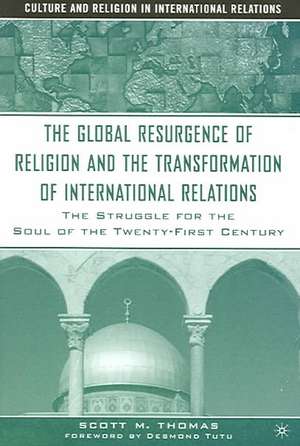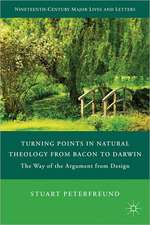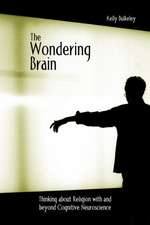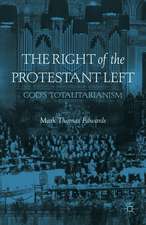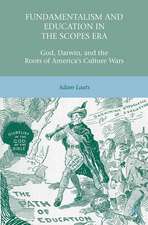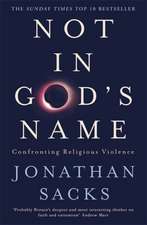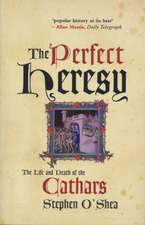The Global Resurgence of Religion and the Transformation of International Relations: The Struggle for the Soul of the Twenty-First Century: Culture and Religion in International Relations
Autor S. Thomasen Limba Engleză Paperback – 3 oct 2005
| Toate formatele și edițiile | Preț | Express |
|---|---|---|
| Paperback (1) | 640.88 lei 6-8 săpt. | |
| Palgrave Macmillan US – 3 oct 2005 | 640.88 lei 6-8 săpt. | |
| Hardback (1) | 641.85 lei 6-8 săpt. | |
| Palgrave Macmillan US – 3 oct 2005 | 641.85 lei 6-8 săpt. |
Din seria Culture and Religion in International Relations
-
 Preț: 299.79 lei
Preț: 299.79 lei - 9%
 Preț: 623.33 lei
Preț: 623.33 lei -
 Preț: 310.74 lei
Preț: 310.74 lei - 20%
 Preț: 693.21 lei
Preț: 693.21 lei -
 Preț: 383.93 lei
Preț: 383.93 lei - 15%
 Preț: 641.03 lei
Preț: 641.03 lei -
 Preț: 393.74 lei
Preț: 393.74 lei -
 Preț: 389.11 lei
Preț: 389.11 lei -
 Preț: 391.99 lei
Preț: 391.99 lei -
 Preț: 387.75 lei
Preț: 387.75 lei - 18%
 Preț: 730.02 lei
Preț: 730.02 lei -
 Preț: 387.75 lei
Preț: 387.75 lei -
 Preț: 389.70 lei
Preț: 389.70 lei - 15%
 Preț: 642.51 lei
Preț: 642.51 lei -
 Preț: 390.63 lei
Preț: 390.63 lei -
 Preț: 390.63 lei
Preț: 390.63 lei -
 Preț: 385.62 lei
Preț: 385.62 lei - 18%
 Preț: 886.12 lei
Preț: 886.12 lei - 9%
 Preț: 747.64 lei
Preț: 747.64 lei
Preț: 640.88 lei
Preț vechi: 753.97 lei
-15% Nou
Puncte Express: 961
Preț estimativ în valută:
122.65€ • 127.57$ • 101.25£
122.65€ • 127.57$ • 101.25£
Carte tipărită la comandă
Livrare economică 14-28 aprilie
Preluare comenzi: 021 569.72.76
Specificații
ISBN-13: 9781403961570
ISBN-10: 1403961573
Pagini: 320
Ilustrații: XV, 300 p.
Dimensiuni: 140 x 216 x 20 mm
Greutate: 0.43 kg
Ediția:2005
Editura: Palgrave Macmillan US
Colecția Palgrave Macmillan
Seria Culture and Religion in International Relations
Locul publicării:New York, United States
ISBN-10: 1403961573
Pagini: 320
Ilustrații: XV, 300 p.
Dimensiuni: 140 x 216 x 20 mm
Greutate: 0.43 kg
Ediția:2005
Editura: Palgrave Macmillan US
Colecția Palgrave Macmillan
Seria Culture and Religion in International Relations
Locul publicării:New York, United States
Cuprins
Introduction: The Global Resurgence of Religion in International Relations PART ONE: BRINGING CULTURE AND RELIGION BACK INTO INTERNATIONAL RELATIONS THEORY Explaining and Understanding Culture and Religion in International Relations Culture and Religion and the Construction of International Society Religion and International Conflict Culture and Religion and Foreign Policy Religious Actors, Social Movements and International Relations Theory Why 'Anarchy is What States Make of it': Mimetic Rivalry and the Social Construction of International Society PART TWO: ISSUE AREAS Protestantism and Hegemonic Stability?: Culture and Religion in the Construction of the Postwar International Order 'What is Europe?': The Role of Culture and Religion and in European Integration Global Social Policy Becomes Foreign Policy: Culture and Religion and the United Nations The Return of the Goddess?: Culture and Religion and Global Environmental Policy Faith and Foreign Policy?: Religion and Civil Society Aid to Promote Democracy and Development The Global Rise of Religious Violence: Is Terror in the Mind of God? How Many Divisions Does the Pope Have?: Culture and Religion in the End of the Cold War PART THREE: CULTURE, RELIGION AND INTERNATIONAL ETHICS Religious Perspectives and Competing Paradigms of International Relations How Can the 'Dialogue Between Civilisations' Begin?: Religious Resources for International Order Conclusion: Taking Culture and Religion Seriously in International Relations
Recenzii
Here undoubtedly is a book that is both helpful and insightful for those of us who feel there has got to be a better way to promote global security and global welfare' - from the foreword by Desmond Tutu, Archbishop Emeritus of Cape Town, Nobel
Peace Laureate
'Scott Thomas' work should be read not only by scholars interested in international relations and development, but also by leaders in civil society - in the NGO's, in the corporations, and in the churches. We neglect religious factors in contemporary history to our great peril. One may quibble with his treatment of certain theorists of "modernity," but he sees key global trends clearly, and argues artfully for policies could correct today's intellectual and moral blinders.' - Max L. Stackhouse, Rimmer and Ruth DeVries Professor of Theology and Public Life, Princeton Theological Seminary, Author/editor of the series, God and Globalization
'Post Cold War and post 9/11 politics have witnessed the global resurgence of religion, nationalism and ethnic identity and underscored the failure of international relations theory to anticipate and adequately address the role of religion and culture. Scott Thomas' The Global Resurgence of Religion and the Transformation of International Relations is a powerful corrective, demonstrating how and why religion and culture are significant forces world politics that have transformed our understanding of IR theory.' -John L. Esposito, University Professor, Georgetown University and author of Unholy War: Terror in the Name of Islam
'The Global Resurgence of Religion is a vital topic on which mainstream international relations research has been oddly silent. In clear and measured prose Scott Thomas explicates the reason for our intellectual failures and develops an original, eclectic perspective that gives new relevance to the constructivist turn in international relations theory. More importantly, Thomas succeeds in illustrating empirically how and why religion matters in world politics. For those interested in regaining their voice on a crucial topic in world politics this book is essential reading.' -Peter J. Katzenstein, Walter S. Carpenter Professor, Jr. of International Studies, Cornell University
'To the surprise of most academics and many politicians, religion has become one of the most dynamic forces in 21st century world politics. Scott Thomas's insightful analysis of this phenomenon fills a gaping hole in international relations theory and should help policy-makers and thoughtful citizens alike think more clearly about the ways in which profound religious and moral convictions can help build a measure of order in world affairs.' -George Weigel, Senior Fellow, Ethics and Public Policy Center
Peace Laureate
'Scott Thomas' work should be read not only by scholars interested in international relations and development, but also by leaders in civil society - in the NGO's, in the corporations, and in the churches. We neglect religious factors in contemporary history to our great peril. One may quibble with his treatment of certain theorists of "modernity," but he sees key global trends clearly, and argues artfully for policies could correct today's intellectual and moral blinders.' - Max L. Stackhouse, Rimmer and Ruth DeVries Professor of Theology and Public Life, Princeton Theological Seminary, Author/editor of the series, God and Globalization
'Post Cold War and post 9/11 politics have witnessed the global resurgence of religion, nationalism and ethnic identity and underscored the failure of international relations theory to anticipate and adequately address the role of religion and culture. Scott Thomas' The Global Resurgence of Religion and the Transformation of International Relations is a powerful corrective, demonstrating how and why religion and culture are significant forces world politics that have transformed our understanding of IR theory.' -John L. Esposito, University Professor, Georgetown University and author of Unholy War: Terror in the Name of Islam
'The Global Resurgence of Religion is a vital topic on which mainstream international relations research has been oddly silent. In clear and measured prose Scott Thomas explicates the reason for our intellectual failures and develops an original, eclectic perspective that gives new relevance to the constructivist turn in international relations theory. More importantly, Thomas succeeds in illustrating empirically how and why religion matters in world politics. For those interested in regaining their voice on a crucial topic in world politics this book is essential reading.' -Peter J. Katzenstein, Walter S. Carpenter Professor, Jr. of International Studies, Cornell University
'To the surprise of most academics and many politicians, religion has become one of the most dynamic forces in 21st century world politics. Scott Thomas's insightful analysis of this phenomenon fills a gaping hole in international relations theory and should help policy-makers and thoughtful citizens alike think more clearly about the ways in which profound religious and moral convictions can help build a measure of order in world affairs.' -George Weigel, Senior Fellow, Ethics and Public Policy Center
Notă biografică
SCOTT THOMAS is Senior Lecturer in International Relations and the Politics of Developing Countries, University of Bath, UK. Thomas is the author of the Diplomacy of Liberation: the ANC's Foreign Relations Since 1960 (IB Taurus, 1996) and has published several chapters in edited volumes.
